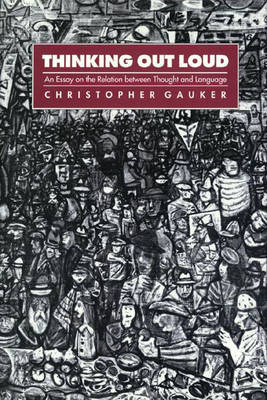
Thinking Out Loud
An Essay on the Relation between Thought and Language
Seiten
1994
Princeton University Press (Verlag)
978-0-691-03400-3 (ISBN)
Princeton University Press (Verlag)
978-0-691-03400-3 (ISBN)
- Titel ist leider vergriffen;
keine Neuauflage - Artikel merken
Challenging a commonly-held assumption that language is basically a means by which speakers reveal their thoughts, this treatise suggests a new approach to language interpretation which draws upon theories of conceptual development, logical validity and the nature of psychological explanation.
Most contemporary philosophers, psychologists, and linguists think of language as basically a means by which speakers reveal their thoughts to others. Christopher Gauker calls this "the Lockean theory of language," since Locke was one of its early exponents, and he contends that it is fundamentally mistaken. The Lockean theory, he argues, cannot adequately explain the nature of the general concepts that words are supposed to express. In developing this theme, Gauker investigates a wide range of topics, including Locke's own views, contemporary theories of conceptual development, the nature of reference and logical validity, the nature of psychological explanation, and the division of epistemic labor in society.
The Lockean theory contrasts with the conception of language as the medium of a distinctive kind of thinking. Gauker explains how language, so conceived, is possible as a means of cooperative interaction. He articulates the possibility and objectivity of a kind of non-conceptual thinking about similarities and causal relations, which allows him to explain how a simple language might be learned. He then takes on the problem of logical structure and gives a formally precise account of logical validity formulated in terms of "assertibility in a context" rather than in terms of truth. Finally, he describes the role that attributions of belief and meaning play in facilitating cooperative interaction. With lucid and persuasive arguments, his book challenges philosophers, psychologists, linguists, and logicians to rethink their fundamental assumptions about the nature of language.
Originally published in 1994.
The Princeton Legacy Library uses the latest print-on-demand technology to again make available previously out-of-print books from the distinguished backlist of Princeton University Press. These editions preserve the original texts of these important books while presenting them in durable paperback and hardcover editions. The goal of the Princeton Legacy Library is to vastly increase access to the rich scholarly heritage found in the thousands of books published by Princeton University Press since its founding in 1905.
Most contemporary philosophers, psychologists, and linguists think of language as basically a means by which speakers reveal their thoughts to others. Christopher Gauker calls this "the Lockean theory of language," since Locke was one of its early exponents, and he contends that it is fundamentally mistaken. The Lockean theory, he argues, cannot adequately explain the nature of the general concepts that words are supposed to express. In developing this theme, Gauker investigates a wide range of topics, including Locke's own views, contemporary theories of conceptual development, the nature of reference and logical validity, the nature of psychological explanation, and the division of epistemic labor in society.
The Lockean theory contrasts with the conception of language as the medium of a distinctive kind of thinking. Gauker explains how language, so conceived, is possible as a means of cooperative interaction. He articulates the possibility and objectivity of a kind of non-conceptual thinking about similarities and causal relations, which allows him to explain how a simple language might be learned. He then takes on the problem of logical structure and gives a formally precise account of logical validity formulated in terms of "assertibility in a context" rather than in terms of truth. Finally, he describes the role that attributions of belief and meaning play in facilitating cooperative interaction. With lucid and persuasive arguments, his book challenges philosophers, psychologists, linguists, and logicians to rethink their fundamental assumptions about the nature of language.
Originally published in 1994.
The Princeton Legacy Library uses the latest print-on-demand technology to again make available previously out-of-print books from the distinguished backlist of Princeton University Press. These editions preserve the original texts of these important books while presenting them in durable paperback and hardcover editions. The goal of the Princeton Legacy Library is to vastly increase access to the rich scholarly heritage found in the thousands of books published by Princeton University Press since its founding in 1905.
| Reihe/Serie | Princeton Legacy Library |
|---|---|
| Verlagsort | New Jersey |
| Sprache | englisch |
| Gewicht | 482 g |
| Themenwelt | Geisteswissenschaften ► Philosophie ► Philosophie der Neuzeit |
| Geisteswissenschaften ► Philosophie ► Sprachphilosophie | |
| ISBN-10 | 0-691-03400-1 / 0691034001 |
| ISBN-13 | 978-0-691-03400-3 / 9780691034003 |
| Zustand | Neuware |
| Haben Sie eine Frage zum Produkt? |
Mehr entdecken
aus dem Bereich
aus dem Bereich


